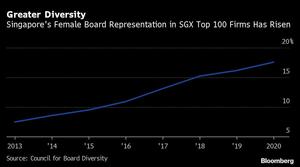 A woman looks at her mobile device during lunch time at Raffles Place financial business district in Singapore on Feb 16, 2021. (ROSLAN RAHMAN / AFP)
A woman looks at her mobile device during lunch time at Raffles Place financial business district in Singapore on Feb 16, 2021. (ROSLAN RAHMAN / AFP)
Singapore’s largest companies missed a collective target to get more women on their boards, with diversity efforts taking a backseat to combating the coronavirus pandemic.
One common feedback from companies is that many female candidates don’t have prior board experience, the the Council for Board Diversity said. That shouldn’t be a “stumbling block” as what’s important is a candidate’s ability to contribute, it added
The proportion of women on the boards of the 100 biggest listed companies rose 1.4 percentage points to 17.6 percent as of end-2020 from a year earlier, according to the Council for Board Diversity. The target was 20 percent. Some companies didn’t view board diversity as a priority last year as they battled the global outbreak, the council said.
“Board diversity, a recognized hallmark of progressive boards even before COVID-19, is more critical now than before,” Loh Boon Chye, co-chair of the council, said in a statement. “Post-pandemic recovery offers opportunities for innovation and business repositioning. Having directors with a wider mix of gender, age, skills, experiences, and backgrounds allows boards the broad-based choices as they assess what is best for the future.”
ALSO READ: WEF: Equal gender pay set back a generation by pandemic
The percentage of top companies with 30 percent or more women on their boards rose to 16 percent in 2020 from 12 percent the year before, the report showed. There were still 18 all-male boards in 2020, and only seven of the top 100 firms were chaired by women.
The council said other jurisdictions such as Australia and the UK quickened their pace of appointing women as directors within top companies.

While there were more first-time directors appointed to boards of the top 100 firms, they remain mostly male.
One common feedback from companies is that many female candidates don’t have prior board experience, the council said. That shouldn’t be a “stumbling block” as what’s important is a candidate’s ability to contribute, it added.
READ MORE: Female entrepreneur takes center stage as officials encourage research
“We hope that more organizations – including companies and statutory boards – will similarly seek out women talents and give them equal opportunity to take the first step onto a board,” said Mildred Tan, the council’s co-chair. “When all organizations keep an open mind and appoint such qualified women onto the boards, it expands the pool of candidates for the entire country.”


